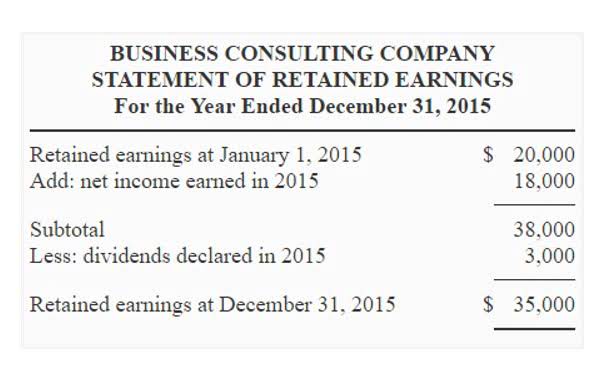
To record this, Michelle processed a journal entry to remove both the $400 trade payable and $500 trade receivable and posted the difference to the suspense account. At a base level, accounting professionals are responsible for learning and maintaining a working knowledge of the account categories a company uses on its balance sheet. These categories are particularly important because they lead to the analysis of asset and liability balances on the balance sheet.
Time Value of Money
In such cases of fraud or inappropriate earnings management, managers may deliberately try to hide the error or prevent correction of it. In other cases, management may try to offer explanations that suggest the error is just a change in estimate, not requiring retrospective restatement. Sometimes these justifications may be motivated by factors that don’t reflect sound accounting principles.
- If there is no immediate resolution, an investigation into the error is conducted.
- In preparing its 2022 financial statements, management of Manaugh Ltd. discovered that a delivery truck purchased early in 2020 had been incorrectly reported as a repair and maintenance expense in that year rather than being capitalized.
- Review the background of Brex Treasury or its investment professionals on FINRA’s BrokerCheck website.
- Once an error is identified, the accounting and reporting conclusions will depend on the materiality of the error(s) to the financial statements.
- An error of omission happens when you forget to enter a transaction in the books.
Change in Accounting Principle
Errors of principle are often simply accounting entries recorded in the incorrect account. Oftentimes, the error of principle is a procedural error, meaning that the value recorded is correct but the entries are made in the wrong accounts. These types of errors can be difficult to identify if they occur because they can still lead to appropriate balancing of debits and credits on the balance sheet, as well as appropriate summations carrying over to the income statement and cash flow statement. Accounting errors come in various forms, each with its own set of characteristics and implications. There are also errors of principle, where a transaction is not in accordance with the applicable accounting principles, and compensating errors, where two or more inaccuracies cancel each other out.

Selection and application of accounting policies
Conversely, a change made to the same allowance to incorporate updated economic data (e.g., unemployment figures) and the impact it could have on the customer population would represent a change in estimate. Once the entity has identified an error, whether material or immaterial, the entity should consider whether and how the identified error affects the design and effectiveness of the entity’s related internal controls. If it is determined that a control deficiency exists, management should evaluate whether it represents a deficiency, significant deficiency, accounting errors must be corrected: or material weakness. In doing so, management should consider the existence of mitigating controls and as highlighted in the SEC’s interpretive release,[4] whether those controls operate at a level of precision that would prevent or detect a misstatement that could be material. Companies strive to hire experienced employees and incorporate protocols that help to mitigate accounting errors but errors can still happen. If they do occur and are identified, companies and generally accepted accounting principles (GAAP) provide guidance for correcting them.
Changes in accounting policies and estimates
Account categories also flow over into the income statement where expenses are reported as either direct, indirect, or capital expenses. Errors of principle can also be a concern when a company changes an established principle already in processing to another, new principle. Accounting errors are usually unintentional mistakes made when recording journal entries.

Intermediate Financial Accounting 2
Unintentional accounting errors are common if the journal keeper is not careful or the accounting software is outdated. The discovery of such errors usually occurs when companies conduct their month-end book closings. An error of omission is when an entry wasn’t made even though a transaction had occurred for the period. For example, an accounts payable account, which are the short-term debts that companies owe suppliers and vendors, is not credited when goods were purchased on credit.
IAS 8 Changes in Accounting Policies, Estimates and Errors
Sales returns for goods sold on credit in September 20X8 of $8,980 were accidentally recorded by processing a sales invoice. IAS 8 was reissued in December 2005 and applies to annual periods beginning on or after 1 January 2005. PwC refers to the US member firm or one of its subsidiaries or affiliates, and may sometimes refer to the PwC network.
- Many errors of principle will be detected before a company issues its final financial statements at the end of a reporting period.
- On investigation, she discovered that it was a direct debit for a subscription to an IT support service.
- They scrutinize the adjustments made to correct errors, assessing whether they accurately reflect the underlying transactions and are appropriately documented.
- An error of omission could also include forgetting to record the sale of a product to a client or revenue received from accounts receivables.
- If however, an error relates to a reporting period that is before the earliest prior period presented, then the opening balances of assets, liabilities and equity of the earliest prior period presented must be restated.
- Service-specific terms apply, including but not limited to our Brex Card Terms, Rewards Terms and Travel Terms.
- Some businesses such as banks and retailers who handle great deals of cash can inadvertently issue the wrong change or make errors in counting money.
- A change of this nature may only be made if the change in accounting principle is also preferable.
- Accounting errors are not the same as fraud, errors happen unintentionally, whereas fraud is a deliberate and intentional attempt to falsify the bookkeeping entries.
- Look out for duplicated transactions or missing entries that might have thrown your books off balance.
- Disclosures related to accounting errors typically include a description of the error, the periods affected, the amounts involved, and the impact on the financial statements.
- Too many incorrect paychecks can break trust in your accounting system or your business as a whole.
If the change in estimate is made in the ordinary course of accounting for items such as uncollectible accounts or inventory obsolescence, disclosure is not required unless the effect is material. If the change in estimate does not have a material effect in the period of change, but is expected to in future periods, any financial statements that include the period of change should disclose a description of the change in estimate. The transparency of the financial correction process is reinforced through stringent disclosure requirements. These requirements are designed to ensure that all material information is made available to users of the financial statements, allowing them to fully understand the implications of any corrections made. Disclosures related to accounting errors typically include a description of the error, the periods affected, the amounts involved, and the impact on the financial statements. This information is often presented in the notes to the financial statements, which accompany the primary financial documents such as the balance sheet, income statement, and cash flow statement.


The Brex Treasury cash management account allows customers to sweep uninvested cash balances into certain money market mutual funds or FDIC-insured bank accounts at program banks. Robson Corporation shows two comparative years, 2011 and 2012, on its statement of retained earnings. Rounding a figure can make your accounting inaccurate and create a series of future errors. An error of original entry occurs when an incorrect amount is posted to the correct account.
If the balances don’t add up or you have an unmatched entry, you likely have a reconciliation error. Reconciliation errors can create an inaccurate financial record for your business, which is particularly important come tax time. Leaving transactions unmatched can also prevent you from realizing that your business is missing money. You can prevent closing errors by setting a closing password in your accounting software.
Laisser un commentaire